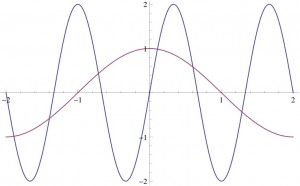What’s up with pre-calculus?
Posted by: Gary Ernest Davis on: May 2, 2012
Pre-calculus is an odd mongrel of a course.
It’s name suggests it’s preparation for calculus.
The course content, commonly involving polynomials, exponential and logarithmic functions, trigonometry and circular functions, suggests the intent of pre-calculus is indeed preparation for calculus.
But there’s something rotten in the state of pre-calculus.
Several people responded recently to a tweet about pre-calculus apparently not working as calculus preparation for about 50% of students who pass it:
![]() Julianna Stockton †(@DrJStockton), April 29, 2012:
Julianna Stockton †(@DrJStockton), April 29, 2012:
“what is the content of PreCalc? Ours (trig) more aptly named “NonCalc” than “Pre…”. Not setting up big ideas of Calculus”
![]() Cody Coy Barlow â€(@coach_barlow), April 28, 2012:
Cody Coy Barlow â€(@coach_barlow), April 28, 2012:
“math skills are watered down at the elementary school level. When kids can’t do fractions how do we teach calc?”
![]() Jim Wolper †(@DrATP), April 28, 2012:
Jim Wolper †(@DrATP), April 28, 2012:
“Many pre-calc students at my university are given undeserved high grades despite demonstrated unreadiness for Calculus”
![]() ANOVA Learning †(@anova_learning), April 28, 2012:
ANOVA Learning †(@anova_learning), April 28, 2012:
“more than likely, because they are inadequately prepared for pre-calculus!”
![]() Gregory Cover †(@gcmathfilm), April 28, 2012:
Gregory Cover †(@gcmathfilm), April 28, 2012:
“precalc doesn’t do the job because basic skills are poor coming into the class. I spend half my time teaching pc reviewing”
A colleague checked on several hundred students who were placed by an Accuplacer test into college pre-calculus. Of those students who passed pre-calculus and went into Calculus I, only 50% obtained a grade of C or better.
This is like a coin toss: students place into pre-calculus, pass the course, yet 50% of them do poorly in Calculus I.
Can we say which students do poorly in Calculus I, and can we say why?
Can we figure out how to help them do better?
Is there something about the pre-calculus experience that is not adequately preparing about 50% of students for calculus?
Having discussed this with several other colleagues it seems to me that in pre-calculus classes we are facing a widespread lack of algebra skills, a lack of trigonometry skills, little to no time for preparation for ideas of calculus, a view of mathematics that is entirely procedural ( http://bit.ly/isyw5d ), poor study habits, likely failure to form study groups (http://bit.ly/IvhZ6k ) and a current lack of knowledge on our part as to who are the students that pass pre-calculus but get a D or less in calculus.
Another colleague, Jim Soden, adds:
“I tell my students that if they don’t earn in the mid 70s in Calc I, it doesn’t project well for their success in Calc II. And it doesn’t, by my observation. I am doing them no favors by skirting the issue, and the hard conversations have to be held. But the kids have to take Calc II so they press on. Many of these are committed students who do other things very well. Sometimes they get religion and do better in Calc II, but as a general rule, they struggle. The issue then, is what if anything we can do about the situation or is it, say, an Engineering Dept. decision? ”
Our observations on the parlious state of pre-calculus are not the first (and hopefully not the last):
- “The failure rate in … precalculus courses can be so bad that as many as 50 percent of students need to take the class a second time. Ms. Thille and her colleagues hope to improve on that record while developing materials of such quality that they’re used by perhaps 100,000 students each year.” http://bit.ly/xPy7bI
- “… data on UIC students confirmed that passing calculus was a major stumbling block for African-American and Hispanic students in entering into mathematics, science and engineering majors. For many UIC minority students with aspirations for a mathematics or science degree, the obstacle came even earlier, in pre-calculus courses. The staggering percentage of failing minority students exceeded 55% in pre-calculus courses.â€Â http://bit.ly/IvhZ6k
- “Success and Failures of a Precalculus Reform Project …  College algebra is often taken as a terminal course or as a prerequisite for precalculus or business calculus. Failure rates in both courses are high, and neither course has lasting value for those students who pass, but choose not to take calculus. The size of the institution and the need for transferability of credits between campuses make it difficult for an individual instructor to depart radically from prescribed course content. This limitation led us to conclude that we could improve the courses most effectively by providing innovative approaches to traditional topics.â€Â http://bit.ly/InKXL4
Postscript:
“In high school, I skipped Pre-Calc and went straight into Calculus. I think that doing so was actually beneficial for me in the long term. I had a lot to catch up on about trigonometry and logarithms, but learning them in the context of Calculus seemed to give me a different perspective on them. While most of my classmates would relate the trigonometric functions to right triangles, I would relate them to the unit circle or differential equations. Perhaps the problem with Pre-Calc is that it requires a rudimentary understanding of Calculus to begin with?”


Leave a Reply